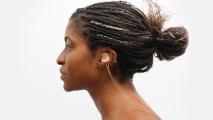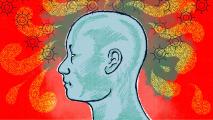Field: Neuroscience
Crows are self-aware just like us, says new study
Crows and the rest of the corvid family keep turning out to be smarter and smarter. A corvid's pallium has more neurons than a great ape's.
Potential cause of unexplained epilepsy cases uncovered
University of Arizona researchers have uncovered a protein that might be behind some epilepsy cases with currently unknown causes.
People who read live longer than those who don’t, Yale researchers say
A study by Yale researchers finds that reading books in particular returns cognitive gains that increase longevity.
After death, you’re aware that you’ve died, say scientists
How can we know that we're dead after we die? Some evidence attributes a certain neurological phenomenon to a near death experience.
Do optimists really live longer? Here’s what the research says
Research shows if you cultivate a more optimistic mindset, you might further increase your chances for a long life.
This implant cools off nerves to give targeted pain relief
A tiny implant that wraps around nerves and cools them to deliver targeted pain relief could help address the opioid crisis.
Discovery reveals how scary memories stick
Researchers believe they may have discovered the mechanism behind fear’s sticking power in our memory.
Magnetic robot can save lives after a brain hemorrhage
Researchers have developed a microbot-containing, magnetically controlled catheter for removing blood from brain hemorrhages.
How the brain responds to surprising events
Unexpected outcomes trigger release of noradrenaline, which helps the brain focus its attention and learn from the event.
Theory of mind: What chess and drug dealers can teach you about manipulation
Every social interaction is a game of chess, trying to get inside someone’s head to navigate what they are thinking or what they will do.
Stimulating deep sleep may improve brain health, memory, and mood
Researchers are trying to harness deep sleep to bolster the glymphatic system, which helps flush brain tissue.
Geopsychology: Your personality depends on where you live
Scientists in the relatively new field of “geopsychology” are seeing links between personality and location.
This already-approved drug could help repair the brain after stroke
Ohio State researchers have found that an already approved anticonvulsant drug helps increase stroke recovery in mice.
HIV drug could improve memory
The common HIV drug maraviroc improved memory linking in aging mice and might be able to help people experiencing memory loss, too.
Brain infusions from younger mice revive memory in older ones
Stanford researchers have found that an infusion of cerebrospinal fluid from young mice improves the memory of old ones.
World’s smallest DBS device reverses Parkinson’s symptoms
An ultra-small deep brain stimulation (DBS) device could increase the number of Parkinson’s patients to receive the powerful treatment.
Stanford scientists can control specific brain cells at a distance
Using infrared light and a Nobel Prize-winning molecule that detects chili pepper heat, researchers can control brain cells from a distance.
Does this artificial intelligence think like a human?
A new technique compares the reasoning of a machine-learning model to that of a human, so the user can see patterns in the model’s behavior.
Psychedelics, brain implants, and the future of chronic pain relief
The future of chronic pain relief could include psychedelics, gene therapies, brain implants, and other cutting-edge alternatives to opioids.
Probiotic gut bacteria can produce a vital Parkinson’s drug
L-DOPA is a miraculous Parkinson’s drug with terrible side effects. Researchers have created drug-producing bacteria that may help.
Death: how long are we conscious for and does life really flash before our eyes?
Seeing one’s life flashing before one’s eye might be our ultimate attempt – however desperate – to find meaning in our lives.
In a hole in Earth’s magnetic field, neuroscientists are peering into the human brain
By using quantum physics to measure magnetic fields, researchers are pushing closer to measuring the brain in ways we couldn't before.
AI maps psychedelic “trip” experiences to regions of the brain – opening new route to psychiatric treatments
To better understand how these effects manifest in the brain, we analyzed over 6,000 written testimonials of hallucinogenic experiences.
Brain implant lets man with locked-in syndrome share thoughts
A man with total locked-in syndrome has used a brain-computer interface to spell out sentences with his mind.
Mammals dream about the world they are entering even before birth
A study finds that baby mammals dream about the world they are about to experience to prepare their senses.
Newly discovered types of brain cells may hold the key to memory
Researchers believe they have discovered two new types of brain cells that play a key role in memory.
Clues to schizophrenia and bipolar disorder hidden in the dark genome
A new study suggests that the causes of these disorders are hidden in "dark genes," which may account for the enigma of their development.
Psychosomatic illness: Are some diseases caused by our memories?
The brain appears to remember immune responses, and memories can trigger them to happen again.
How the antidepressant Prozac could treat blindness
Prozac is a widely used antidepressant. Data indicates that the drug could be used to prevent blindness due to macular degeneration.
Brains scans of the placebo effect show new way to treat depression
A meta-study of placebo effect research has revealed a link between the phenomenon and brain stimulation as a depression treatment.
How a bedtime routine may affect your brain — and your sleep
A mouse study has yielded new insights into the effect of a bedtime routine on the brain, which could lead to new therapies for insomniacs.
Scientists use ultrasound to control brain cells in animals
Researchers have used ultrasound to trigger the brain cells of mice with a technique called sonogenetics.
Mutation protecting against Alzheimer’s edited into human cells
Scientists have used CRISPR to edit the "Icelandic mutation," which protects carriers against Alzheimer's, into human cells.
Researchers can predict rats’ behavior by reading their brains
A team at the University of Oregon have decoded the patterns of brain activity to predict basic actions in mice.
Researchers are testing neural stimulation as a long COVID treatment
Small pilot trials of two different types of external electrical brain stimulation suggest the technique may work as a long COVID treatment.
Blocking an immune system protein helped mice recover from brain injury
Blocking an immune system molecule that accumulates after traumatic brain injury could significantly reduce the injury’s detrimental effects
Brain wrinkles and folds matter – researchers are studying the mechanics of how they form
Brain folding is another poorly understood mechanism of the most complex known structure in the universe.
The DMT ‘elves’ people meet while tripping
Why do so many people encounter these 'elves' after smoking large doses of DMT?
Edison and Dali’s “creative nap” trick seems to actually work
Briefly entering the hypnagogic state appears to boost creative thinking, just like Thomas Edison and Salvador Dalí said it would.
“Dancing” molecules repair spinal cord injuries in paralyzed mice
A treatment for spinal cord injuries was able to reverse paralysis in mice by “dancing” to connect with cells near the site of the injury.
Architects design new mental health facilities with healing in mind
Architects are incorporating neuroaesthetics insights into designs for medical facilities in an attempt to promote positive mental health.
Brain implant relieves woman’s treatment-resistant depression
A woman with severe treatment-resistant depression has found relief, thanks to “pacemaker” implanted in her brain by UCSF researchers.
Here’s why sensory perception research was awarded a Nobel Prize
Physiologists David Julius and Ardem Patapoutian were awarded the Nobel Prize in Medicine for their research on human sensory perception.
Therapy can relieve chronic back pain by rewiring the brain
A psychological treatment for chronic back pain left two-thirds of study participants with little-to-no pain after just one month.
Mini brains grown in the lab sprout primitive “eyes”
Researchers have grown mini brains with light-sensitive eye structures that could lead to breakthrough treatments for vision disorders.
Brain-wide gene editing may one day treat Alzheimer’s
Researchers have developed a brain-wide gene editing technique that treated Alzheimer’s disease in mice.
Implantable “neurograins” may be the key to mind-controlled tech
A new kind of brain-computer interface uses tiny neural implants called “neurograins” to record brain activity in rats.
Hungry mice show why you should take study breaks
The spacing effect — a strange phenomenon by which you retain information more readily if you take study breaks — is now less of a mystery.
Already-approved ALS drug may help Alzheimer’s patients
A small phase 2 study has found evidence that ALS medication riluzole may have potential as a drug for Alzheimer’s.
First neuron-level map of a monkey brain revealed
The first neuron-level 3D image of an entire macaque monkey brain could have a major impact on the world of neuroscience.
Researchers have created a brain sensor swarm
Researchers at UC Santa Cruz have developed an injectable swarm of nanosenors they hope will measure the brain noninvasively.
Baby mice “dream” about the world before seeing it
Before the eyes of baby mice open, their brains appear to use retinal waves to prep their vision systems to detect objects and motion.
New treatment reverses age-related memory loss in mice
A treatment that reversed age-related memory loss in mice could one day treat or prevent such cognitive decline in older people.
Neuroprosthesis lets paralyzed man “speak” whole words again
An experimental neuroprosthesis that translates brain activity into words on a computer screen has given a paralyzed man back his “voice.”
Hair-thin spine stimulator could relieve severe back pain
A new implant that delivers pain-relieving spinal cord stimulation can be put into place using just a needle — no invasive surgery required.
These mind-reading helmets could be a Fitbit for your brain
Kernel has developed two mind-reading helmets that record the same brain activity data as massive, million-dollar machines, but cost just $100,000.
Treatment appears to stop Alzheimer's in monkeys
NYU researchers have modified monkey’s immune system to slow their equivalent of Alzheimer’s disease and improve their cognition.
Google and Harvard have created the most detailed brain map yet
Google and Harvard have released the most detailed map yet, called a connectome, of a section of the human brain.
Neck-zapping device helps sleep-deprived soldiers think
A handheld device that delivers vagus nerve stimulation was shown to combat the effect of sleep deprivation in soldiers.
Hope and controversy: FDA approves first new Alzheimer's drug in decades
The FDA has approved the first new Alzheimer’s drug in decades, but the decision brings not only hope, but controversy.
What happens when your brain imagines the future?
Research out of the University of Pennsylvania suggests imagining the future is a two-brain region job.
Will human augmentation move too fast for our brains?
To show how human augmentation can affect the brain, participants in a new study underwent fMRIs after learning to use a prosthetic called the "Third Thumb."
Experimental procedure zaps nerves to lower blood pressure
Renal denervation, a procedure that uses ultrasound pulses to zap renal nerves, showed promise as a treatment for resistant hypertension in a recent trial.
Hidden Brain podcast's Shankar Vedantam: Why the truth is not always helpful
His new book explores the benefits of self-deception.
New brain-computer interface turns mental handwriting into text
A new brain-computer interface translated a paralyzed man’s “mental handwriting” into text on a computer screen.
Four types of Alzheimer’s discovered in international study
A study has identified four distinct types of Alzheimer’s disease, based on how the tau protein spreads in patients’ brains.
These brain-sensing headphones could help you focus
Boston startup Neurable is now accepting preorders for Enten, brain-sensing headphones that use EEG data to help users’ maximize their focus.
App can detect early sign of autism in toddlers
A Duke University smartphone app that can detect an early sign of autism in toddlers could one day make diagnosing autism in young children far easier.
Neuroscientists are making "bug brain soup"
A novel method for counting neurons that involves mashing insects’ brains into a “soup” has led to several new discoveries about bugs.
FDA authorizes mind-controlled exoskeleton for stroke rehab
Neurolutions’ IpsiHand — a brain-computer interface that uses an exoskeleton to assist with stroke rehab — has been authorized by the FDA.
Back-poking robot triggers presence hallucinations
A back-poking robot can trigger presence hallucinations in people with Parkinson’s disease, giving researchers a way to finally study the phenomenon.
Game triggers auditory hallucinations in mice and people
An experimental game that triggers auditory hallucinations in both mice and humans could lead to new treatments for schizophrenia.
Deep brain stimulation: explained
Deep brain stimulation is being studied as a treatment for any number of neurological and psychological conditions. But what is it, exactly?
Wireless brain-computer interface moves out of the lab
A new wireless brain-computer interface was able to record and transmit brain signals as effectively as the “gold standard” wired systems.
Therapeutic bed could help prevent brain damage in babies
Calmer is a therapeutic bed for incubators that simulates a caregiver’s breathing and heartbeat to relieve stress in newborns.
AI uses sound waves to read the minds of monkeys
Functional ultrasound tech can be used to map the brain activity of monkeys, suggesting it might be useful for future brain-machine interfaces.
“Zombie” cells grow in the brain after death
After death, gene expression increases in the brain’s glial cells — and those “zombie” cells could affect how we study neurological disorders.
Researchers have built a mini-lab for mini-brains
Researchers have created a “tiny machine” to better study brain organoids, clumps of stem cells that simulate the brain.
It's now possible to diagnose concussions with saliva
Saliva was used to diagnose concussions with 94% accuracy, suggesting that an objective concussion test may finally be within reach.
Brain mapping: Explained
The brain is a difficult place to work. How can brain mapping help open the black box between your ears?
New brain implant can be charged wirelessly
A new brain implant contains wireless charging tech that could eliminate the need for surgeries to remove and replace drained batteries.
4 people in the world have a mysterious dementia. Could it hold a key to Alzheimer’s?
Alzheimer’s has proved difficult to treat. But solving the mystery of this ultra-rare frontotemporal dementia may unlock new understanding.
Gene therapy shows promise as a glaucoma treatment
A new gene therapy was able to repair a damaged optic nerve in mice, suggesting it might be useful for treating glaucoma in people.
Blood test for Alzheimer’s now available at doctors’ offices
For the first time, a blood test for Alzheimer’s disease has received approval to be used in doctors’ offices in the U.S.
Scientists test mind control with light — no surgery required
In a new breakthrough, scientists use optogenetics to manipulate brain cells in mice without surgery or brain implants.
This parent is helping push autism gene therapy forward
Not too long ago, autism gene therapy was a pipe dream. Now, armed with specific targets and new methods, a small wave of gene therapies is gathering.
Dopamine and serotonin may do more than we thought
Dopamine and serotonin are crucial brain chemicals. A new study that measured them simultaneously in active brains suggests they may do more than we think.
Help scientists figure out whether brain training apps work
To figure out how people might benefit from brain training apps, researchers are looking for 30,000 volunteers willing to play brain games science.
New brain implant reads minds from inside a blood vessel
A first-of-its-kind neural interface called the Stentrode sits in a blood vessel in the brain, picking up signals it can wirelessly transmit to a computer.
New ALS treatment appears to slow disease progression
A new ALS treatment that appears to slow disease progression offers hope to those battling the incurable neurological disorder.
Elon Musk: Neuralink brain implant detects pigs' movements
During a livestream, CEO Elon Musk presented the latest Neuralink brain implant, as well as what he claimed were several pig recipients of the device.
Left-handed people are “left-out” of brain research
Left-handed people are systematically excluded from brain research, due to an archaic doctrine. These neuroscientists want that to change.
Nerve-stimulating earbud could accelerate language learning
A non-invasive vagus nerve stimulation device can make language learning easier — and it might help with other types of learning, too.
Ketamine discovery may lead to new antidepressants
Researchers have uncovered new insights into how ketamine affects the brain, potentially illuminating the path to new antidepressants.
“Off-switch” in mouse brains offers new hope for pain relief
A newly discovered part of the mouse brain appears to naturally stop pain processing, and it could lead to more robust pain relief options in the future.
Treating depression at home with a tDCS headset
At-home tDCS headsets are helping people treat their depression without having to go to a doctor’s office.
Could VR change how you trip on ketamine?
Virtual reality meets ketamine therapy to help treat pain, anxiety, and depression, to name a few.
The case for love-enhancing drugs
Drugs don’t just affect the user; they shape relationships too. And a pair of bioethicists thinks we should consider them for relationship enhancement.
Developing a better mind-controlled prosthetic hand
This new technique allows a person to control their prosthetic hand precisely and in real-time by amplifying the nerve signals from their residual limb.
Series|
Dope Science
I use ketamine for depression – here’s how it works
Commonly known as a party drug, ketamine’s powerful effects on the brain have led doctors to further explore its medical potential. Now, the animal anesthetic is providing relief and hope for people with severe depression.


































































































